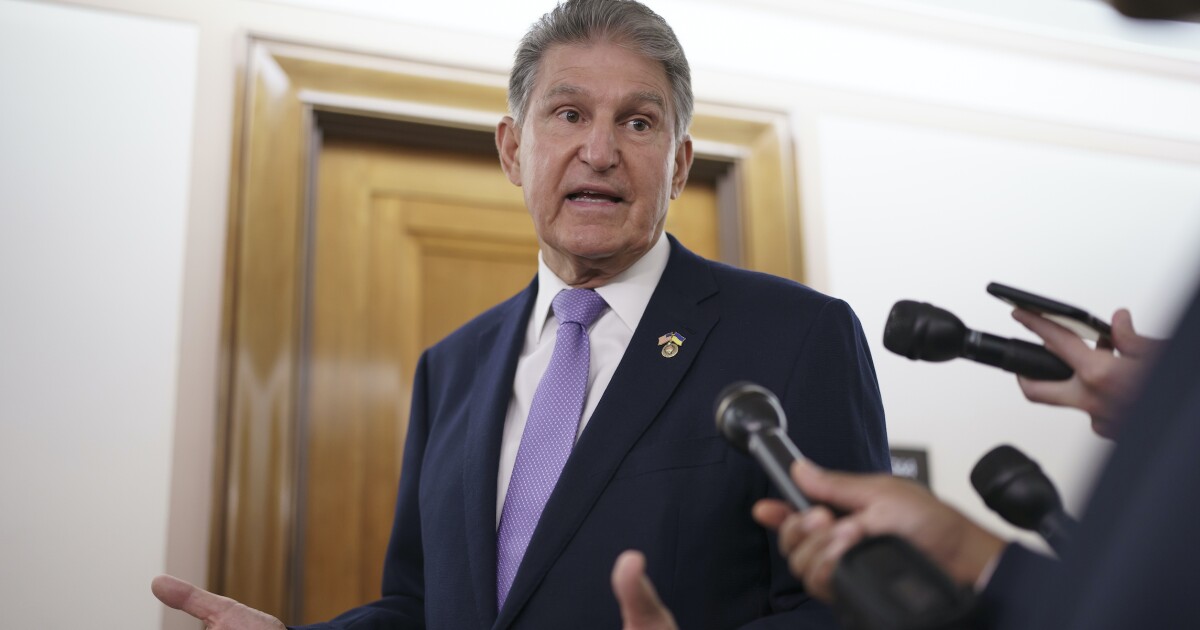

Build Back Better is dead, Sen. Joe Manchin (D-WV) said Wednesday, announcing that he has instead reached a deal with Senate Majority Leader Chuck Schumer (D-NY) on an alternate measure known as the Inflation Reduction Act of 2022.
HOUSE OVERSIGHT COMMITTEE TARGETS GUN INDUSTRY PROFITS AFTER MASS SHOOTINGS
As Democrats seek to defend their congressional majorities this fall amid voter concerns over inflation, the bill’s title is seemingly designed to address these worries.
Manchin, a centrist Democrat who is recovering from COVID-19, said late last year he would not support the $2.4 trillion social welfare and green energy bill, arguing its price tag was too high. Manchin’s position frustrated his Democratic colleagues, who had already trimmed the bill from a more expensive version in an attempt to negotiate with him, and sparked the wrath of liberals who thought the bill should have been larger. Without his support, Democrats were left unable to pass the legislation in the Senate, where they could have otherwise passed the bill using a process called budget reconciliation, which would allow them to do so with only 51 votes.
The Senate is currently split 50-50, with Vice President Kamala Harris acting as the tiebreaker.
“Over the last year, leaders in Washington have ignored repeated warnings about the severe threat of inflation and the consequences of unprecedented domestic spending,” Manchin argued in a lengthy statement.
“Despite these concerns and my calls to give the country time to fully realize the impacts of such historic levels of spending and our inflation crisis, many Democrats have continued to push for trillions more in spending to meet a political deadline,” he said. “As difficult as it is for some to hear, political calls to action that ignore the severity of the crises we face and will continue to face are a recipe for national disaster.”
The purpose of a reconciliation bill, Manchin said, should be “to get our economic and financial house in order.”
“Contrary to foolish talk otherwise, America cannot spend its way out of debt or out of inflation,” Manchin said. “With respect to my position, I have never and will never walk away from solving the problems facing the nation we all love. I strongly support the passage of commonsense policies that reduce inflation and focus on the major challenges confronting America today and in the future.”
Manchin said he sought input from colleagues on both sides of the aisle on “a path forward that removes inflationary policies so that Congress can respond to Americans’ suffering from high prices.”
“Based on that work, I now propose and will vote for the Inflation Reduction Act of 2022,” he said. “Rather than risking more inflation with trillions in new spending, this bill will cut the inflation taxes Americans are paying, lower the cost of health insurance and prescription drugs, and ensure our country invests in the energy security and climate change solutions we need to remain a global superpower through innovation rather than elimination. Whether it is the threats to our energy security, high inflation, exploding national debt, persistent income inequality, supply chain chaos or the emergence of a new Cold War, it is time to put away the partisan swords and advance legislation that is in the best interests of the future of this nation and the American people we all represent — not just one party.”
The bill would begin to pay down the national debt, Manchin argued, and protect small businesses from higher taxes.
“Tax fairness is vital to our nation’s economic future,” he said. “It is wrong that some of America’s largest companies pay nothing in taxes while freely enjoying the benefits of our nation’s military security, infrastructure and rule of law. It is commonsense that a domestic corporate minimum tax of 15 percent be applied only to billion-dollar companies or larger ensuring that America’s largest businesses are no longer able to operate for free in our economy. Furthermore, to avoid inevitable partisan gamesmanship and increase confidence in the fairness of the tax system, tax reform should never put U.S. businesses at a disadvantage against international competitors. Our tax code should not favor red state or blue state elites with loopholes like SALT and should focus more on closing unfair loopholes like carried interest. Through the enforcement of a fair tax code, we can use the revenue to cut the deficit and lower the cost of healthcare for working families and small businesses.”
Manchin said the bill also addresses energy and climate crises by investing “in the technologies needed for all fuel types — from hydrogen, nuclear, renewables, fossil fuels and energy storage — to be produced and used in the cleanest way possible.”
“It is truly all of the above, which means this bill does not arbitrarily shut off our abundant fossil fuel,” he said. “It invests heavily in technologies to help us reduce our domestic methane and carbon emissions and also helps decarbonize around the world as we displace dirtier products. Our persistent and increasing dependence on foreign energy and supply chains from countries who hate America represents a clear and present danger and it must end.”
Manchin argued, “For too long, the reconciliation debate in Washington has been defined by how it can help advance Democrats political agenda called Build Back Better.”
“Build Back Better is dead, and instead we have the opportunity to make our country stronger by bringing Americans together,” he said. “I will do everything I can to usher in a new era of compromise and commonsense that will make America more energy secure, financially sound and a more united country for this generation and the next.”
Calling the Inflation Reduction Act a responsible step forward, Manchin argued, the “question for my colleagues is whether they are willing to put their election politics aside and embrace the commonsense approach that the overwhelming majority of the American people support and will best serve the future of this nation.”
White House press secretary Karine Jean-Pierre told reporters at her Wednesday briefing that “we welcome hearing about the drug, the lowering cost of pharmaceutical drugs, which is going to help so many seniors, which is so incredibly important.”
CLICK HERE TO READ MORE FROM THE WASHINGTON EXAMINER
“We do believe that it’s going to be part of lowering inflation,” she said.
Naomi Lim contributed to this report.







